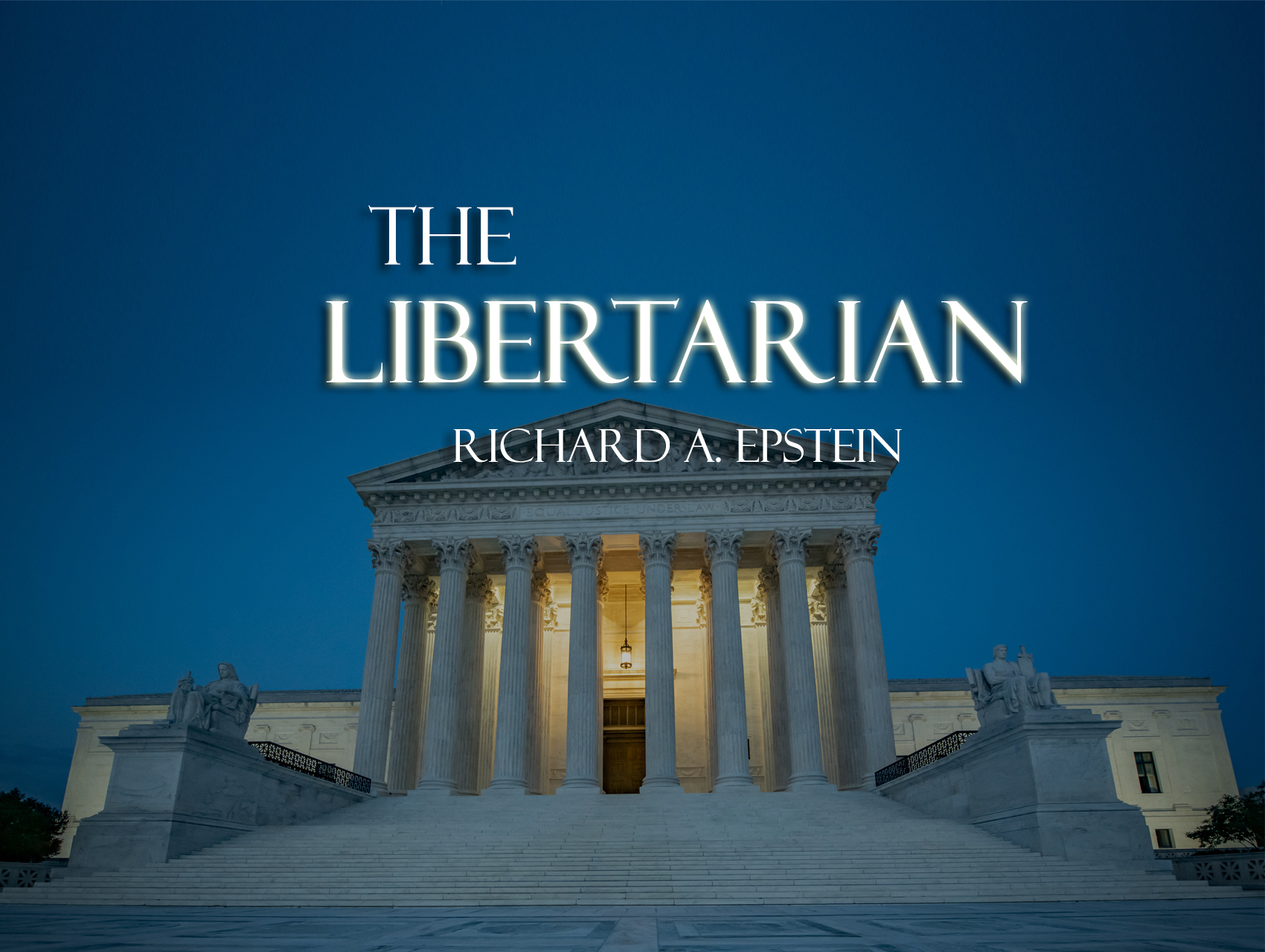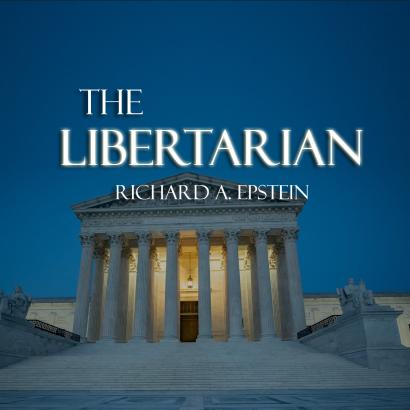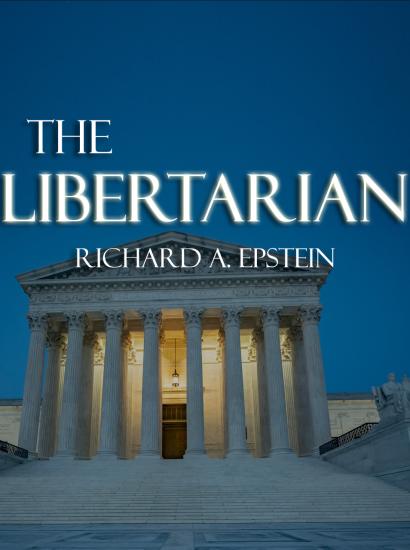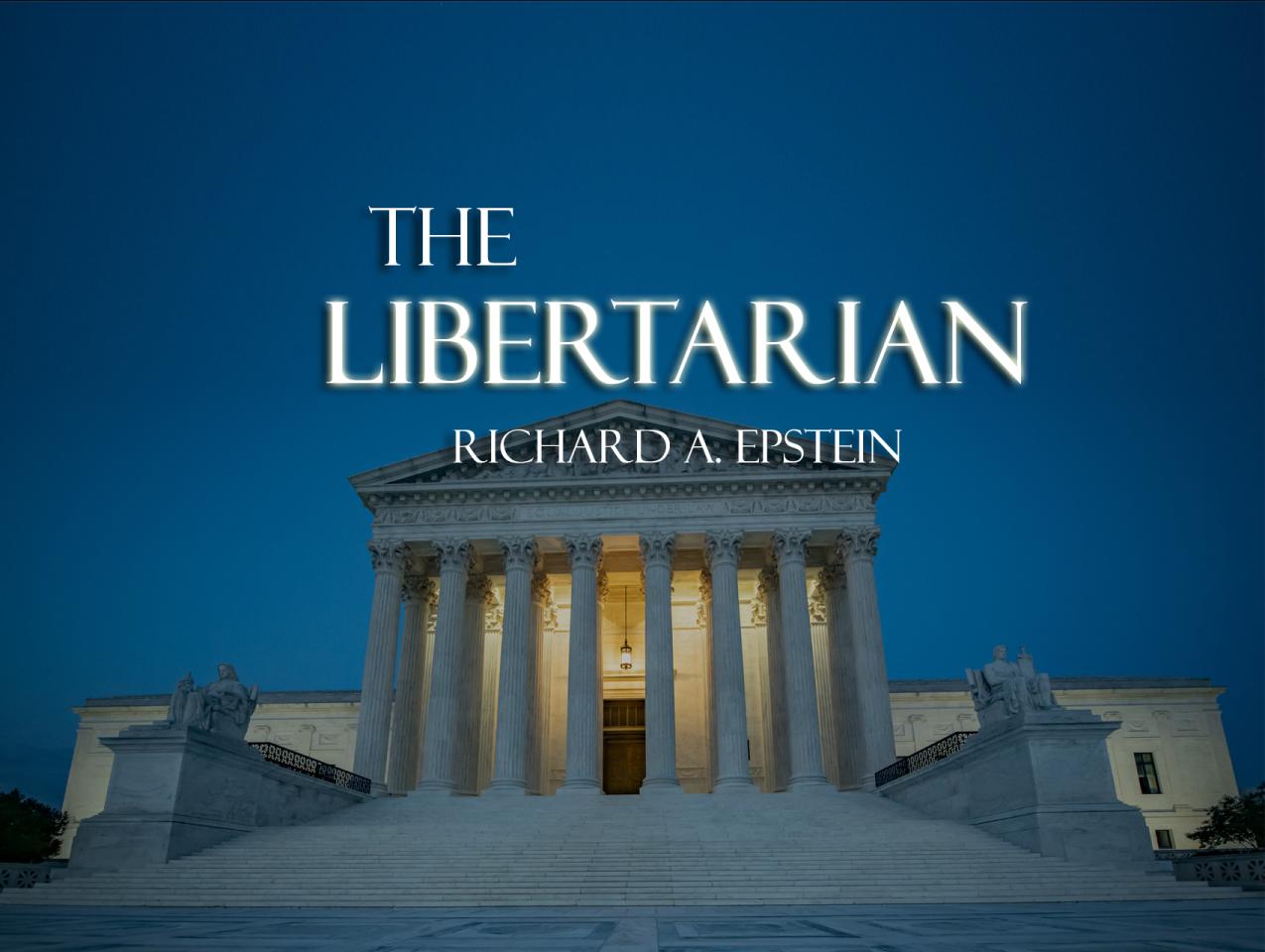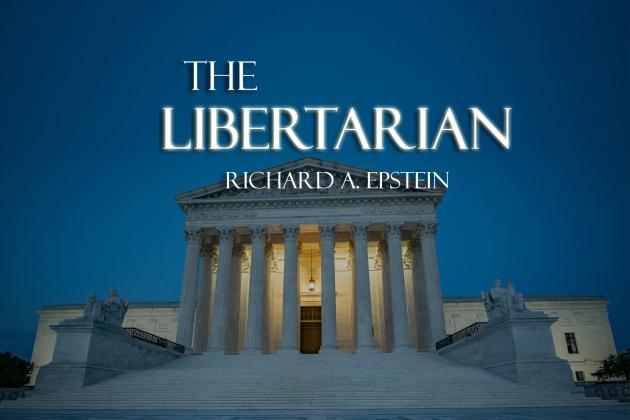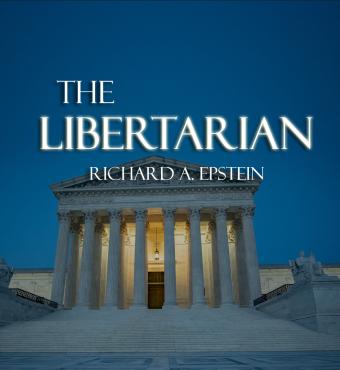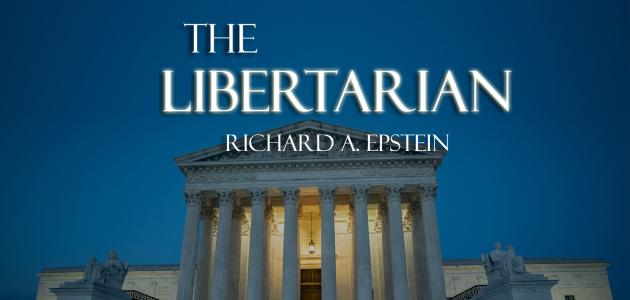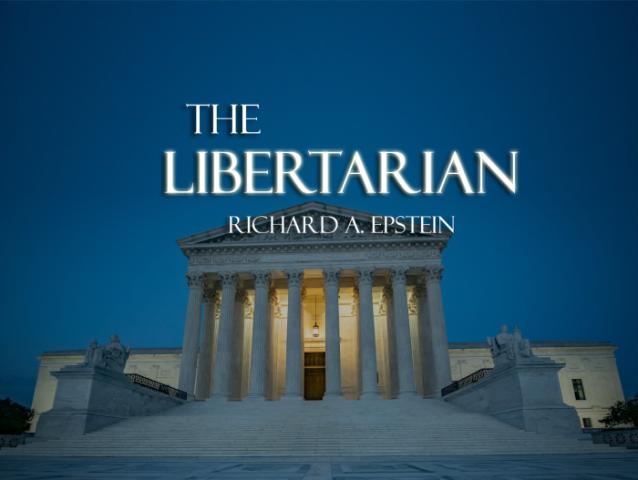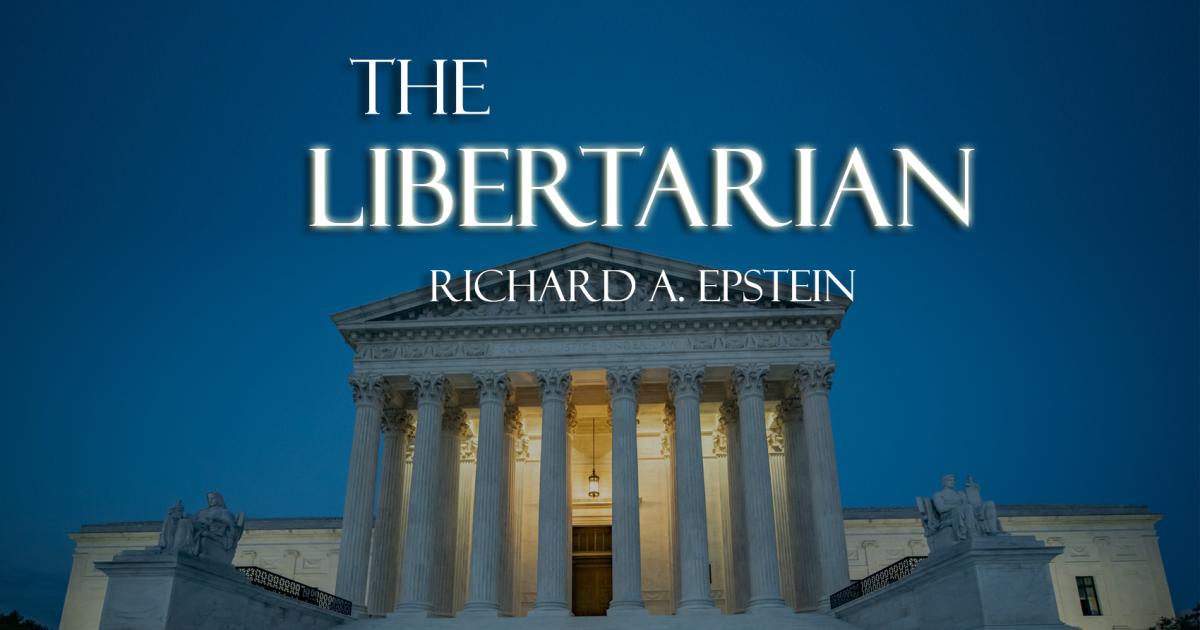Richard Epstein takes us behind the scenes on the Amicus Brief he wrote with John Yoo about a Supreme Court case that has important implications for what kind of income is allowed to be taxed.
>> Tom Church: This is The Libertarian podcast from the Hoover Institution. Today we're discussing Richard at the Supreme Court, kind of. I'm your host, Tom Church. And The Libertarian is, of course, Professor Richard Epstein. Here at Hoover, Richard is the Peter and Kirsten Bedford Senior Fellow. He's also the Laurence A Tisch Professor of Law at NYU, and is a senior lecturer at the University of Chicago.
Richard, what I'd actually like to discuss today is an amicus brief you wrote with John Yoo surrounding, I think, a little known tax change that was passed in the Tax Cuts and Jobs Act, the TCGA, in 2017. It's being challenged at the Supreme Court. I know you're not a huge fan of it, so let's talk about it.
It surrounds the mandatory repatriation tax, the MRT. Here's the deal for the uninitiated. One of the things the TCGA did was to start to move the US to a sort of territorial tax system instead of a purely global one. And to do that, it had to look at foreign ownership of corporations and, I suppose, unrealized earnings that money was saved overseas, and we haven't paid taxes on.
So the MRT said, all right, if you own at least 10% of a controlled foreign corporation, you're gonna pay taxes on unearned income that you haven't paid taxes on yet, dating back to 1986, up to 2017. It's gonna be a one time tax that you can pay now or over eight years at a lower rate.
Now, the case here, Richard, involves two petitioners, Charles and Kathleen Moore, they own 11% of a foreign corporation. As a result of the TCGA, they had to pay taxes on this foreign ownership. You and John Yoo have written this amicus brief in defense of the Moores with an interesting approach that involves both the nature of taxation and the 16th Amendment.
And I can't wait to get into that. But first, I have to know, how did you even come to work on this brief?
>> Richard Epstein: Well, what happens is, we're known in the business, we talk a lot.
>> Tom Church: A little bit, right, yeah.
>> Richard Epstein: And some guys came up to me and says, look, this is a really important issue.
This issue in the case itself is about $14,000. And the precise question is, if you repatriate $370 or 380 billion without incident, does the entire scheme blow up over the $14,000? Why was this a source of particular irritation? It's because the Moores were told that they had to pay tax on dollars that they could not get out and that they might not ever get out.
The value to them was certainly not the value that would be if you could sell these shares in the open market because of the restrictions. And so they said, what should happen is, why don't you wait until we actually get the money to tax us? And the government comes back and it says, realization of income in your own hand is not a prerequisite for taxation.
Now, if all you were worried about were Mr and Mrs Moore, nobody would do anything about this case. But what happened is the general proposition threatens to shake to its foundation the entire system of the Internal Revenue Code. And so lots of people who wrote about this case all said the same way.
They said, if the Moores sink or swim, if they swim, we'd like to have it on a broad ground. If they sink, we like it on a very narrow ground. But please don't use this highly idiosyncratic case on a very technical provision about repatriation. And so opine about the basic structure of the Internal Revenue Code.
Well, the government writes a brief on the petition for certiorari, and it says, you know, we're not talking about the wealth tax in this particular case. We're not talking about the complete taxation of unrealized income. But these things might come up. And by the way, the definition that we give of income, which is not the realized money from an exchange or from the receipt of cash, would allow us to do all these things.
So the alarm bells start to go up, and the question then turns out to be, what's gonna be the starting point for an income tax analysis? The one model being, if you get cash, that's fine. If you get marketable securities that you could easily sell, that's fine. But if you start getting funny kind of property that you can't do anything with, maybe you postpone the taxation.
And the key early case on this was Eisner and Macomber from 1920. My favorite judge Pitney is at file, and there was a stock dividend in that case. So for every two shares you had, you got a third. But the value of the first two shares went down as the third one went up.
And the question, could you be taxed on the third share? And what our good friend Justice Pitney said was, no. And that was the sort of general principle about realization on a highly specific set of cases, namely recapitalizations, which today, under special provisions of the Internal Revenue Code, the reorganization provisions are tax free, so long as you don't take any money out of the corporation.
So then how did Richard Epstein get interested in this, right?
>> Tom Church: Yeah.
>> Richard Epstein: Well, I took taxation in 1966 with.
>> Tom Church: Tax code looked a little different then.
>> Richard Epstein: Well, no, it wasn't, that's the interesting thing. And then the next year, when I went to USC in 1968, I had a teacher, and I was teaching tax and torts at the same time.
And all of a sudden, I got myself into the middle of this battle as a very young and naive person. So what happened is Mr Bittger starts the class with a case called Drescher, and that's receiving an annuity worth $5,000, subject to some kinds of restrictions. And you could immediately see that the restrictions matter, or does the face value of the thing matter?
And they go through all sorts of arguments, and they say, well, you know, this is concrete enough. We could tax it as income, even though it's going to be relative over taxation. So then Bittger looks at us in the class, and he asks the question. He says, congratulations, you have now been made partner at your law firm.
And you look at the Internal Revenue Code, and it says, you're taxed on any property that you receive. Well, this partnership interest is something that you receive, and then you start to figure out what it's going to look like. You are now 29 years of age, has a whole $50,000 in it.
The partnership interest over the next 50 years could easily benefit to you to the tune of several million dollars. But on the other hand, you may not be able to get it all at once. You may have to reinvest. So the question he has is, is you have to pay tax on the partnership interest at the time you receive it?
And everybody in the class kind of looked at him like he was bonkers. And we all said, of course not. What happens? You wait till the money comes, and then you pay the tax. So it turns out that the preference for taxing property, in very bad forms, against that preference is very strong.
And nobody wants to tax a partnership interest when you don't have liquid assets and you don't know how much it's worth. And so as I started to go out and teach, I realized that this was a dominant theme in the entire Internal Revenue Code. No matter where you look.
The code was designed to postpone taxation even after the realization of income, so long as what came in was something that you could not value and you could not sell. And if you got rid of the standard realization requirement, it would mean that the simple appreciation of stock could result in taxation.
And so to give you an idea of how much is at stake on this simple kind of proposition, you, Mr Church have an art collection of 30 pictures, okay, let's say, and lots of other stuff. And the government comes along and says, all these pictures have appreciated in value.
We know you haven't sold any of them. But what we're gonna do is to figure out what the value is, and we're gonna tax you on the appreciation, and then you have to pay it. You could sell the paintings, you could mortgage the paintings. You look around and you say, my God, I don't know how to value these things needed as the government, it's gonna take years to do it.
This is crazy. And so what happens is, typically what we do is we wait until you sell a painting, and if you get in, say, $100,000, and you pay $20,000 for it, the tax is computed as 100,000, less 20,000 or $80,000. So the number of transactions goes down by about 99%, and the complexity for the transactions goes down about 99%.
So one thing is a trivial occurrence, and the other thing is World War III. And the government is saying, well, we can do this. We may not do this. And then somebody says, if we can do this, then what we could do is we could tax your wealth, whether or not you've got an income.
And so what happens is $14,000 worth of dispute shakes the foundation of the entire tax system. And then the question is, how do you deal with this? Well, there are two approaches. The one that was taken by the principal brief and 22 of the amicus briefs, or whatever the number was, but not me, was to study the word realization.
And to say, it's such an important concept, you just can't get rid of it in taxation. But there are briefs which say, hey, it really doesn't matter. So what I did was to do something quite different, and this was more me than you. Although John was helpful, I said, what's the alternative definition of income, as opposed to the gain that you get from the sale of an asset or the receipt from labor?
The definition dates back to a man named Haig, Robert Haig, supplemented by a man named Henry Simon. And it says, take any two points in time and the accretion of wealth between those two points of times, plus the consumption within that time, all of that counts as income, right?
And you don't have to have any realization with that. And so if that definition in fact works, what happens is the government can take income as it's defined in the 16th Amendment and say, you know, unrealized appreciation is income. It doesn't have to be apportioned amongst the state, and we can do all of this stuff.
Well, what is it that you're doing? And it turns out that nobody who's in favor of the Haig-Simons formula actually applies the Haig-Simons formula. They do something completely different from that particular formula. So the purpose of the brief that I wrote was to explain, if you tried this formula, it's a suicide mission.
And then you leave open the question, are suicide admissions unconstitutional, or are they constitutional? So it was an effort to explain why it is that in the general case, the realization requirement is extremely important in blocking all sorts of nonsense. But in this series of very important but modest situation, it turns out these concerns with liquidation and with valuation simply disappear.
And if they disappear, then tax is appropriate. So the way in which this starts to work is, you say, look, we have this general definition of taxation, which is figure out what the receipts are and what the costs were and take the difference between them. And that's going to work over a huge number of cases.
But where there are exceptions when you don't have valuation problems or liquidation problems, then the realization requirement can be waived. But in many cases, what we do under the Internal Revenue Code is you get in funny property, for example, you have a share in a closed corporation, and you swap it for a share in another closed corporation.
Nobody's sure what the value of the two shares are. Do you have to pay tax on the game when neither of them work? And what you do is you start saying, well, no, there are theories called reorganizations. So if these shares are changed as part of a restructuring of a company, like a recapitalization, what we do is we postpone the tax, tell people they can't raise their bases, and then wait until they distribute cash and marketable securities, at which point we impose the tax upon it.
And that system's been around for 100 years. And so the question is, you really, on the basis of a series of dicta, talking about a $14,000 case, want to blow up a system of that kind of magnitude? So the answer that I gave was, no. And then I said, well, they said, but there are all sorts of cases that have allowed you to do this, but if you look at them, they don't.
So let me give you but one case to show you what the Haig-Simons formula does and what they did in practice. There's a very interesting question of what's the definition of income? And the standard definition of income is money that's received from the combination of capital, or labor, or both, right?
And that kind of covers working on the one hand, and investment income on the other. So, obviously going to cover 99% of what it is that people have. And then you could sort out whether it's immediately taxed or not. But in this case called Glenshaw Glass, somebody sued in 1946 for travel damages under the antitrust law, and then received an award some six years later.
And the question is whether or not punitive damages are gains from capital or labor is something confined. And if you look at it, it's just not clear under ordinary language whether this is, quote, a windfall that doesn't fall under either category or not. So what the Supreme Court did is it says, we're uncertain of the answer, but we're gonna give a liberal construction in favor of the government.
So we'll treat this stuff as taxed at the time you get the money. And if you note, if you get money, there's no problem in figuring out how much it's worth or no problem about liquidity. But if you wanted, that's not using the Haig-Simons formula. What it is is expanding the definition of income and waiting till you get cash.
But if you wanted to use this other formula, what you would do is you'd start with the share of stock, and after the lawsuit was commenced, you'd have to figure out what its change in value was each year, up or down. Now you try and value a lawsuit, it's absolutely nightmarish, so you'd have to go through this exercise for six separate years.
Nobody in his right mind has ever tried that, nobody wants to try it. And so what you do is you apply the same formula to this rather novel form of income. Amount received less cost than there are other cases in which it turns out you're entitled to income.
What you do is you have a coupon on a bar bond, and you give it to your son, and he cashes it. And they say, well, is it income to the father who owned the bond, or to the son who cashed the coupon? And essentially, the view is, what really happened here is dad got the money and then gave a gift to the son.
So it should be taxed to him in a high income tax bracket and not to the kid. And then the receipt by the son is called a constructive receipt by the father, which means it's as though he kept the coupon, got paid, and then turned the money over to the son.
And that second transaction could either be a gift or payment for services, depending on the circumstances of that case. And that's also right. So you go through all of the cases, none of them actually deal with the taxation of unrealized income. And the point is, that's a lesson well learned.
And there are other adjustments that you could make that should be made, but please don't make this one. Because what's gonna happen is you're going to increase the incidence of taxation by probably 1000%, the difficulty of evaluation by 1000%. And you will wipe out entire estates, as people have to desperately mortgage and sell their shares at the end of a tax year to figure out what their liabilities are when nobody has any information.
And then if the year is 2022, you've actually had huge losses, and nobody knows whether you could deduct those losses against previous things, store them up, ignore them or whatever. And so it's an absolute nightmare. And so the purpose of our brief was to say, Supreme Court, this realization requirement really matters.
And then when there are cases where it doesn't matter, I can tell you what happens.
>> Tom Church: What happens, Richard?
>> Richard Epstein: That's such a tough question, right?
>> Richard Epstein: What happens is you make different kinds of adjustments. So there are two things, and they're both, in their own ways, tricky.
One is there's something known as depreciation on assets, right?
>> Tom Church: Mm-hm, yep.
>> Richard Epstein: You get something and we know that this thing is going down in value. We don't know what the exact amount of this is, and there is nobody who says that when we're dealing with depreciation.
What we do is we calculate the change in the value of the company from year one to year two. In turns, it may well be that the asset has appreciated in the time, and we still allow depreciation. Maybe not wise, but we do it. And what's that we do is we figure out what this thing cost.
And then we give you a table which tells you how much you can deduct. Well, if you're getting a deduction, you don't have a liquidity problem. And if it turns out there's a fixed formula which tells you how much you could take off each year, you don't have a valuation problem.
And then what happens is, at the end of the day, when you sell the asset off the new basis, it turns out you calculate the gain amount received, less the basis. So the system works perfectly well. Now, I'm not gonna bore you with this, but if there's borrowed capital, it changes the calculations.
And in 1972, I wrote an article, esoterically entitled the application of the Crane Doctrine to limited partnerships, where Crane was a rule which allow you to depreciate borrowed assets. Which led to all sorts of craziness, which we've never fully escaped. It's a tax subsidy at the beginning and a tax penalty at the end.
So you mistime these things, but put that aside. The second piece that we have is there are all sorts of fancy assets that you have, which are derivatives. And that means they have no productive value. They're just, if the value of the shares go up, your derivative will go up.
If the value of the shares go down, it will go down. But it's just a piece of paper, and it's a trade. And oftentimes what people do is they buy one position and sell another position. And the great fear is, if you wait for realization of these assets, what you'll do is you'll sell your losses and hold your gains and get undeserved deductions.
So you say, look, this is a portfolio. It's pretty easy to value these things, because they're all financial assets, and they're all traded on exchanges. You know exactly what they worth. I don't care whether you hold it or whether you sell it. What we will do is we will net out the gains and losses from your portfolio for a given year and tax you on that.
And since the assets are perfectly liquid, and the valuation problems are near zero, it becomes a very useful way to prevent tax evasion. So the way in which you want to put it is this change of the realization requirement is a Pareto improvement, makes everybody better off and nobody worse off, a more reliable tax system, whereas everything I've worried about before is a Pareto disaster.
And so you don't wanna do this. So what you do is you treat the tax code as a series of approximations, trying to figure out how you get closer to the ideal mode of taxation. You start with a definition of income, but that's not the optimal form. And then you make these deductions.
And if you actually study the code synoptically over many years, what you see is there's a constant change, often by legislation or by revenue rulings issued by the Internal Revenue Service, in which, for the most part, they move this stuff at the general level to very good positions.
At the same time, you get a series of tax subsidies, which I don't talk about in this paper, two rapid depreciation allowances, capital gain instead of ordinary income, treatment for certain kinds of resources. Those are separate problems, and you can try and solve them. And in fact, when I was doing a lot of tax work in the 1970s, I spent a lot of time on limited partnerships.
And the simple question as to whether or not a general partner of a limited partner, when he sells out a lot of money, is he really getting an investment like everybody else, which is a capital gain? Or is he getting a deferred payment for service, which is ordinary income, or some combination of the two.
I mean, those are hard, interesting questions, but that's not the ones we're facing. And so, in effect, what we say is, if you look at this structure, it turns out it's a very good structure in the general part. And the last thing you wanna do is to apply the Haig-Simons formula.
When it turns out, if you actually look at the cases that are set to apply, there isn't a single one of them which actually taxes unrealized depreciation on an incremental basis on an annual calendar. So be wise, do not do this. It's not that the formula is infinitely rigid.
You can find exceptions to it, but they're principled exceptions to it, and they fit the general theory. And basically, modifications of statutory schemes should always be designed to create positive sum games. Whether you're talking about upper airspace, whether you're talking about water rights, whether you're talking about land and mortgages, that's the hope that you want, and you can do it in the tax world.
So that's the part that I wrote and John helped. I can tell you if you want what the part that John wrote, and sort of-
>> Tom Church: I do wanna end on that, Richard, because I think it's interesting to get into an actual 16th Amendment argument. And unsurprisingly, to understand what's going on here, we need a little bit of history of the 16th Amendment, because you would do right in the brief, right?
The Supreme Court can strike this down and still maintain its acceptance of an income tax and the rest of it without running afoul of the 16th Amendment. So how is that?
>> Richard Epstein: Well, the 16th Amendment just says you don't have to apportion money income as you do with respect to direct taxes.
The definition of a direct tax, you get a lot of words, but it boils down to poll taxes on individuals and real estate taxes on land. Early on, there was a question of whether or not you applied the direct tax to carriages that were done. And they refused to do that because they were frightened to death.
And that whereas the land that you have in various states is relatively constant, in one state, you could get ten times as many carriages as you can in another. And if you play the apportionment game, each of the carriages in the state, with abundance of them, would be subject to a tiny tax.
But with land, they were willing to do that. And the argument was, we want a higher rate of taxation on the poorer states. You hear what I said? Poorer state, because when they come into the Union, we do not want the tax system to be a device which would allow us to shift money from rich states to poor states.
Essentially, we got two guys, and they're buying insurance policies. We want each of them to pay a premium in proportion to the benefits they get. And so this thing really has some currency at a time when state boundary lines were really thought important. As you go to the 21st century, it's clear that all of this stuff about states being independent units has less grand political significance, even though it's immensely important, obviously, in everybody's day in life.
And so what happens is, there's a case called Pollock against Farmers' Loan, and this is the decision decided in 1895. And it asks a deceptively simple question to which everybody, in my view, has given the wrong answer. That's a promising way of beginning, right? We know that a tax on land is, in effect, going to be a direct tax.
And so now somebody leases the land, and the question is, if you lease the land, is the rent that you get from the lease, is that going to be a direct tax, so it has to be a portion, or is it going to be ordinary income? So it doesn't have to be a portion.
And if you ask the question in that form, you can't answer it. Now, why is that? Well, it turns out there are all sorts of leases. There's a document known about triple net leases. And you could borrow property, I mean, rent property, and you could agree to pay the taxes on the property, and so the landlord gets less rent, and you could agree to pay for the insurance on the property.
So again, if you're bearing that cost, the landlord gets less, and you could pay for the services on the property, which, again, would reduce the rent. That would be the triple net lease. Or you could do it the other way. Well, in many cases, when you teach landlord tenant law, what you say is the landlord is not only supplying space, but he's applying services, which is common, right?
The common areas, the upkeep and so forth. Whereas in some lease, the landlord just simply collects a rent for the use of property. Well, if it's the use of property only, then the direct tax seems to be a tax on the rental. But if you're throwing in a service component, that should be much more difficult to classify.
Anyhow, the Supreme Court, by a five four vote said it's a direct tax. And bells and whistles went off throughout the United States. And what John did, it's just a simple point, but was incredibly clever, is he said, you look at all the debates that took place when we had the 16th amendment.
And essentially the debate was whether or not you overturn Pollack and Farmers loan and say that you can tax the income from real estate under a lease arrangement as ordinary income. And he said, you go back and you read anything you want on that debate by anybody at any time, in any way.
And the only thing they are debating is that question. He said, nobody ever wants asked the question of whether or not unrealized appreciation on stock it should be regarded as taxable income. So if you have a text which is a little bit squishy as the original 1913 income tax is, you read it in light of the debate which informed this stuff.
And you don't see a leg to stand on for a general non for getting rid of the realization requirement. But what you can do is just say, as these instruments start to evolve, it turns out when you get novel circumstances, if it doesn't defend any fundamental principles of taxation, you can do what I did.
So essentially, the two halves of the brief are designed to complement one another, and the hope is that it will scare the Supreme Court off of making some really large statement about realization is irrelevant. At which point the dangers that you can see from a Biden Congress, or from a Sanders tax bill, or from Elizabeth Warren or from Emmanuel Saz is just enormous.
I think we're right on this particular point, and I think it was important not just to talk about what we mean by the term realization, which is an important issue. But important to explain that the alternative theory of taxation, which the government proposes, is completely unworkable and historically untenable.
>> Tom Church: You've been listening to The Libertarian podcast with Richard Epstein. As always, you can learn more if you head over to Richard's column, the Libertarian, which we publish at defining ideas @hoover.org. If you found our conversation thought provoking, please share it with your friends. Rate the show on Apple Podcasts, Spotify, or wherever you're tuning in.
For Richard Epstein, I'm Tom Church, we'll talk at you next time.
>> Hoover Representative: This podcast is a production of the Hoover Institution, where we generate and promote ideas advancing freedom. For more information about our work, to hear more of our podcasts or view our video content, please visit hoover.org.







